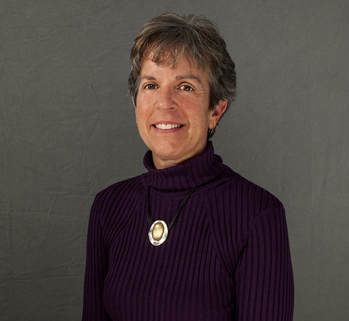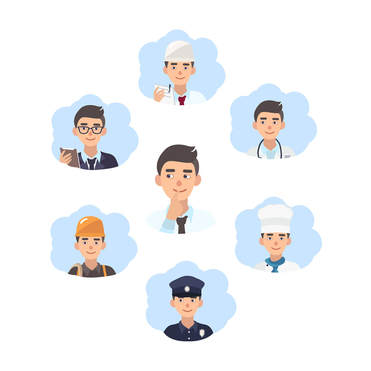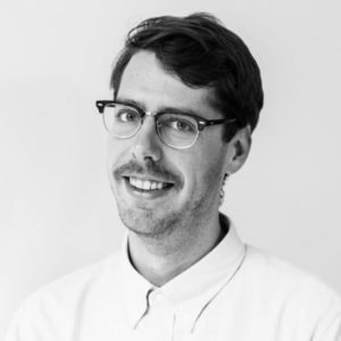 Kathy Rentsch is the assistant vice president of Quinsigamond Community College in Worcester, Massachusetts. I was introduced to Kathy by my mom, who was friends with Kathy in high school. When they reconnected on Facebook a few years ago, I was always interested in hearing about Kathy’s work, especially as a fellow member of the education community. I was just as interested to hear her story as to hear her thoughts on the current state of higher education. Our conversation has been edited for length and clarity. When you were 17, what did you want to be? I don't think I gave it a whole lot of thought. My dad got an associate’s degree after World War II, but I was really the first in my family to go to a traditional college. My mom worked from when I was about three, so I had that example of a woman that worked. If I were to think about myself back then, I think I was interested in a helping profession like social work, but I wouldn't have known it by that name. Generally the women that I knew that were working were teachers, nurses, those kinds of traditional jobs. I didn't really have a view of what else might be out there. How did you decide to attend Boston College? I went to a Catholic high school and I don't think I applied to any schools that weren't Catholic, but I don't think that was conscious. My family wasn't even very Catholic, so I'm guessing that was influenced by my guidance counselors. I looked at liberal arts colleges and I definitely wanted to be in a city. My top choice was Georgetown - that's where I really wanted to go. I had made some visits to various schools and I just fell in love with Georgetown. But I got waitlisted there and got into BC, which was my second choice. I thought, “Well, if I'm waitlisted, they don't really want me as a first choice,” and my parents didn't have the experience to give me any perspective on that, so I just decided to go for BC. In the end, where you go probably doesn't matter as much as the significance we place on it, right? But, boy, at that point in your life, it seems like everything. How did you choose your major? When I started college, I thought that I would be pre-med and go to medical school. I started in biology, and I found out really quickly my first year that if I had to go through all that chemistry and everything to get to medical school, I was never going to survive. I wasn't enjoying it. So I moved into psychology, but I think the thing that shaped me more than anything in college was a program at BC called PULSE, which was a service program, but it was more than that. I took courses in philosophy and theology and then I did service in the community, and every week we brought that service back into the classroom in the context of what we were studying. And BC is a Jesuit school, so there was a lot of emphasis on social justice and action. I had some really powerful experiences with people who challenged me to understand what our commitment was to people who didn't have as much, who hadn't had justice in their lives. It really opened my eyes. We weren't a terribly wealthy family, but I had not experienced that kind of thing growing up. I did PULSE all four years, so even though it wasn't a major, all the other courses I took were built around that. How did you get from college to where you are now? I got a job in human services and I almost immediately realized that I wasn't going to go far unless I had more education, so I decided that I needed to go to graduate school. I got into the BU School of Social Work, and just by happenstance - I don't even know where I met this woman - I talked to somebody who had just graduated from the BU School of Social Work, and she said, "Don't do it. I have a lot of loan debt and I'm not really being offered any more salary than I was before." Now, I'm sure her career path was probably stronger, but that really woke me up to whether I wanted to do this. And although BU was a good school for social work, I'm not really sure I was ready to make the commitment. So I didn't do it. I took a job in personnel at a biomedical instrumentation company, just to do something different. And then I decided to have [my daughter], Jess, and that took me off on a different pathway. At that time, having a baby that young was not really what people were doing anymore. I left my job after my maternity leave, and for six months I didn't work at all. When we moved to Worcester, I applied for a job teaching English as a second language part-time at Quinsigamond Community College, where I work now, where I've been on and off. One of the things I did with PULSE was I got very, very involved with a faculty member who was working to resettle about 80 Southeast Asian families who were refugees from Laos. She needed a lot of help getting families acclimated, where to buy food, how to use the T, getting them to doctors and social services and all that. So I got very involved with her, and I really thought maybe I would go work in refugee camps after I graduated. But by that time, they didn't really need just another English speaker. They needed Southeast Asians who had been in the country to come back and help. But I had done a lot of English teaching, so that was an easy transition for me to make, and it was fun. I taught several different ESL classes and at that time, there was a lot of grant money for adult education, English as a second language, and programs where you bring literacy programs into the workplace. So the college got one of those grants, and I got hired to be the coordinator for the first program. We were very successful at getting grant money, so over the next eight or nine years, we had multiple grants and I was coordinating all of that. And we had lots of opportunities to present at conferences and talk about our work, and it was all kind of cutting-edge at that time. We were building something that didn't really exist, so there was a level of creativity to it, and I worked with a really great group of people. It was fun to be a part of that. During that time, I did my master’s in adult education at the local state college here, Worcester State College. And then I was ready to do something new, so I took a job with a public education foundation, the Alliance for Education. It was a nonprofit, and we did a lot of fundraising for public education. We did partnerships between businesses and schools; we did different programs that brought attention to the education reform stuff that was going on in the state at that time, and how people in the community and parents and corporate partners could become involved and support that. That was an awesome job because I got to meet a lot of teachers, guidance counselors, principals, and some of the key superintendents not only in Worcester, but also in the surrounding communities. And this was while my daughter was in elementary school, and then eventually [my son], Anthony, as well. I felt like I knew so many people in the school system, and that was valuable at so many levels. I felt really strongly about committing to public schools, and having your kids to go school in the community where you live and work. That's something I really grew to appreciate through that work. Then I had an opportunity to go back to Quinsigamond. There was a local vocational institute that they were going to close. And Quinsigamond was the only college that stepped up to say, “We think we can make some of those programs into certificate or degree programs.” So the vice president of academic affairs was looking for somebody who could do a lot of the data gathering and write the document that we had to present to the state. I had never worked on a project like that before, but over the course of a year and a half, we introduced 11 new degree or certificate programs at the college. It really expanded our repertoire. People believe the only route to a solid future is to go to a four-year, prestigious institution. I think the Obama administration did a lot to help community colleges strengthen what they were doing and really create opportunities for people who were not college-going or who have been traditionally underserved. And I think what people don't realize is that community college is not the end. It's a step in a journey, and people will continue to go back to school and go back to school. If we can get people to understand that that four years is not the beginning and the end, or that that two years is not the beginning and the end; rather, it's the beginning of a process of figuring out how you're going to manage a career and your skills and your knowledge for a lifetime. So at that point, I was the director of this special project, and then the state offered an early retirement and the college saw a huge group of people retire. I agreed to take on the dean position for the business and technology area for a year as an interim. They went through a search, and I saw a lot of candidates that were going to use our college as a stepping-stone to something they saw as bigger and better. There was nobody that expressed any real interest in staying here for any length of time. And by then, I had gotten attached to this group, to what we were doing. So when the college decided to reopen the search, I applied and was appointed to the position. I did that for 14 years. We started a lot of new programs, we opened a new building, we did all kinds of good stuff. And then we just had another big retirement, and it was time to reorganize. So six months ago, I moved into the role of assistant vice president, and I have responsibility for the adult ed program where I first started, all of our workforce development programs, our career services, and then this kind of amorphous thing called “innovation.” The one thing that we all felt is that we were trying to start a lot of new things, but it's always managed by a committee where everyone's responsible and nobody's responsible. So in this role, my goal is to be that point person, the one that's shepherding things to make sure we go beyond pilots and actually get them working. I've also been in a doctoral program for five years, an education doctorate focused on higher ed administration. I started it after my son went to college, and I think that was a really good time in my career to do this, because I have enough experience to have context for what we're reading and writing about. For my dissertation, I'm looking at the role of community college academic deans as middle managers when there's a planned change in the organization. I've been interviewing my colleagues about this experience, and it's pretty amazing to have that opportunity to talk to people. Looking back, what seems clear to you now? I love what I've done and I love working with community colleges. It kind of brings together that sense of the helping profession from way back when and all of my work with the refugee families, because we work with so many of those same people. But there are a couple of things that I wish I had done. I really wanted to move to Washington, D.C. when I got out of college, but there was no Internet and I didn't actually know how to do that, how to look for a job. So I stayed in Boston, but I met my husband, so that was something good. I think maybe I would have been a little bit more daring about moving around, about traveling a little more and not getting so serious about work right away. But it was the 80s and when we graduated from college, everyone got jobs at the big eight accounting firms, they went into management training for programs at the big banks, people just went to work and then worked ridiculously long hours. So I don't regret anything, but I might have been a little bit more adventurous. I think there are an enormous number of opportunities now for people that didn't exist back when I was 23 and first getting out of school. I would highly encourage people to take advantage of all the offices at the college you're at to get internships, to study abroad. Go find something that is just a little hard to do. Go off and do all those things, because there's not a better time in your life than your 20s to do all of that. And it goes by really fast.
0 Comments
 When it comes to choosing a major in college, there are two options: liberal arts and pre-professional. Liberal arts has something of a stigma as people assume, first, that it has something to do with fine arts, like painting or sculpture; and second, that it’s impractical [insert underwater basket weaving joke here]. Pre-professional majors, on the other hand, get a unanimous thumbs up from dads everywhere who use phrases like “return on investment” when discussing their child’s college education. Many of my students ask me which path is better, and the answer really depends on what you’re looking for. First, some definitions. Harvard College explains that “in [a] liberal arts program, students are broadly educated in the social sciences, the natural sciences and the humanities.” So while that does include fine arts, it also covers history, physics, sociology, and English, and much more. The vast majority of people I’ve interviewed for When I Was 17 have received liberal arts degrees, like Brittany who majored in applied mathematics, or Sari who majored in economics and sociology, or Blaine who majored in Latin American studies. In fact, the vast majority of colleges in the US primarily offer liberal arts majors. A pre-professional program is one that leads directly to a profession (although it may require an advanced degree). This includes pre-med tracks, where you can officially major in anything but you have to complete certain prerequisites for medical school. Nursing, physical therapy, and pharmacy are other common pre-health programs. Engineering and computer science are especially popular pre-professional degrees right now. And to some extent, business degrees like marketing, accounting, and finance fall into this category. Both types of degrees come with pros and cons. A liberal arts major can feel like a big question mark after you graduate, without a clear arrow pointing you toward specific jobs you should apply to. But that openness can benefit you in the long run, giving you the flexibility to pursue fields that are just emerging, or even starting something of your own. Many of the biggest names in business, tech, and politics hold liberal arts degrees:
A pre-professional degree can lead more directly to a lucrative and stable job right out of college, which is something many parents are understandably more comfortable investing four years of college tuition for. But if the industry changes and your work becomes automated or outsourced, you may have difficulty pivoting to something new with a narrower, more specialized degree. Ideally, you’d be able to study whatever you love and then turn that into a satisfying career where you make enough money to live the life that you want. But in real life, you’ll probably have to make compromises in your major or your profession depending on your priorities and goals at that time. The best advice I can give is to stay open and flexible, take initiative to get involved with things that interest you, and make the most of the opportunities that present themselves. Whether liberal arts or pre-professional, basket weaving or data entry, those things will always lead to professional success.  Michael Waldrep is a filmmaker and researcher for Studio Olafur Eliasson in Berlin. I first met Michael last year through my friend and travel partner, Kari, also known as Michael’s sister. I had always found Michael’s professional path intriguing, so when I was in Berlin again last week, I bribed him with ramen to let me delve into his history. What followed was the longest interview I’ve done yet, and one of my favorite stories of finding professional satisfaction. Our conversation has been edited for length and clarity.  Just this past Tuesday, May 1st, my students and thousands of others decided once and for all where they are going to attend college this fall. As with every year, there were moments of surprise, with yes’s from schools that we expected to say no, and generous scholarships that made all the difference. There were also moments of rejection, with long-shot applications falling just short. When I get those disappointed texts, I always tell my students the same thing. It’s okay to feel sad or frustrated or disappointed. You worked hard, and things didn’t go the way you wanted them to. Feel your feelings. But know that this is not a referendum on your future. I know, with complete certainty, that you will be okay. The quality of your college experience, your career, and the life you are going to live is still completely in your hands. And the reason I can say that so confidently is because of these interviews. The people I’ve spoken to have gotten rejected from colleges, failed classes, and lost out on interviews, internships, and jobs. They’ve made mistakes and been fired. They’ve deferred college or dropped out of school or opted against college altogether. They’ve changed majors, changed universities, and gone back to school decades later. They’ve made compromises because of money or their families or geography. They’ve been told yes and no, many times over. And yet, when I get to the end of our interview and I ask them if there’s anything they would change about how they got to this point in their careers and in their lives, almost invariably, they say no. They say it almost apologetically; they admit that it’s a cliché. But the truth is, most people wouldn’t change anything because they’re happy with where they’ve ended up. And in all likelihood, you will be too. This doesn’t happen by accident, of course. The stories I’ve collected are filled with moments of risk-taking and vulnerability and, occasionally, a leap of faith. There’s also a healthy amount of luck and privilege underpinning these success stories. But more than anything, there is an openness described best in my recent interview with Scott Reardon: “You have to look at the doors in front of you, and if one opens, it might not be what you thought, but don't be afraid to walk through it, because you don't know what's on the other side.” It’s that openness that I try to encourage in my students when they’re applying to college, and it’s something I hope they’ll take into their university experience and beyond. |
What is the When I Was 17 Project?When I Was 17 is a blog series dedicated to collecting the varied stories of people's career paths, what they envisioned themselves doing when they were teenagers and how that evolved over the course of their lives. I started this project with the goal of illustrating that it's okay not to know exactly what you want to do when you're 17; many successful people didn't, and these are a few of their stories.
Archives
October 2020
|